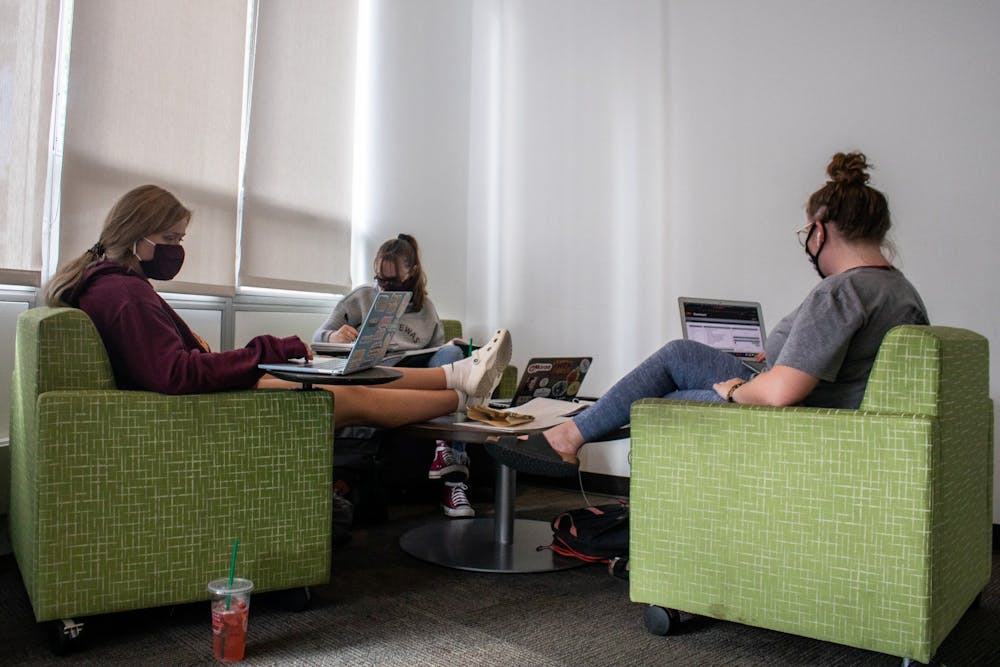College in the Virtual World: How to navigate a new style of learning, living
An ongoing obstacle with online learning is access to connectivity and appropriate devices.
Kole Taylor, communications manager at Central Michigan University, said while social distancing comes first, personal and community antidotes are on the horizon. The university's Office of Information and Technology (OIT) is well-equipped for Fall 2020 semester challenges, he said.
“In rural areas, if you do have access somewhere reasonably nearby with high-speed internet, that is going to provide the best experience with using Webex or Teams,” Taylor said.
Otherwise, Taylor said using a mobile hotspot or sharing phone data can be a good solution.
He suggested individuals be honest about needing devices and allow themselves to reach out to friends or family to see if there are any electronics they can use to tackle course work.
“If you don’t feel that you have any other options, reach out to your instructor or your academic department office. They may have some recommendations, and there’s a chance that they may be able to work with OIT to find a good solution for you,” Taylor said.
When it comes to facing problems with virtual learning, honesty seems to be the best policy.
“Some of the most common complications reported to us from students are with audio, video in Webex, Teams as well as internet connectivity,” Taylor said. “The best recommendation I would make for all cases is practice, practice, practice. Fire up a Teams or Webex meeting with a friend so that both of you can make sure everything is set up correctly.”
Climbing Over Misconceptions
Taylor said misconceptions about virtual learning come from both students and faculty. He said instructors are worried about lower student engagement because of an increase in distractions or fearing their teaching is not as effective online.
He said students seem worried about not receiving a good, quality learning experience due to being separated from instructors and peers.
“I think the best way to change one’s perspective on this is to consider how very much of our personal lives are spent online -- especially in the midst of a global pandemic,” Taylor said. “We’ve already redefined social experience in an online context, so if we take that approach to learning, I think it sounds less scary for people.”
Here are some tips from Taylor on how to improve virtual learning:

Finding Silver Linings
Korine Bellmore, a regional coordinator for the Michigan Farm Bureau, was attracted to online learning for its convenience -- utilizing it at the dawn of her collegiate career, Bellmore was satisfied by feeling as though she had it all.
However, this interpretation isn’t as easily received by students thrusted into the virtual classroom by COVID-19’s wake. As schools like Michigan State University suspend in-person learning, Bellmore hopes her experiences can offer a silver lining to what might become inevitable.
After learning virtually from CMU for more than a year, the DeWitt native said her time has been saved significantly.
Belmore learned under CMU to guarantee flexibility while escalating her position at the Michigan Farm Bureau -- flexibility she said she continued to harness when COVID-19 swarmed with the unknown.
“I don't have to bother going to campus for a lecture that probably won’t be anything worth my time,” Bellmore said. “You create a really good system for yourself that can be taken outside of school and put into work or into your daily life.”
Bellmore said her best method for mastering online coursework was printing out class timelines and highlighting each deadline. By creating a physical outline, she said students can “find a groove” for navigating through discussion boards and quizzes.
“Managing time can be hard since you have to rely on yourself for motivation. I think that’s the most difficult part,” Bellmore said. “Doing (assignments) right when they are posted or even working ahead makes it so much easier so you don’t have to worry about it.”
She said procrastination was her biggest enemy and that overcoming it went hand-in-hand with online schooling. Afterward, Bellmore said commitment has been one of the strongest values earned through learning virtually.
“You have to keep going and it’s by yourself," she said. "That teaches you a lot of self-dependency,”





